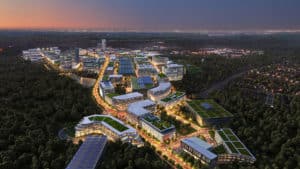
Several anti-submarine blimps, training aircraft and fighters are shown stored in 1944 inside the giant Hangar Two at the former South Weymouth Naval Air Station. Image courtesy of the U.S. Navy.
LStar Communities isn’t the first company to come up short trying to crack the code of what’s needed to attract commercial development at Union Point, the 1,450-acre former naval air station in South Weymouth. It likely won’t be the last.
Boston-based lender Washington Capital Management has scheduled a foreclosure auction on Thursday for many of the undeveloped residential parcels, which have potential to house more than 3,300 housing units on 115 acres. A redevelopment authority that oversees the property could vote next month to remove Raleigh, North Carolina-based LStar as master developer.
Bad market timing, public mismanagement and allegations of financial misconduct by LStar executives have set back attempts to turn the World War II-era dirigible station into an economic engine creating thousands of jobs on the South Shore.
Even if a new developer steps in, Union Point faces headwinds from the growing preference of companies for urban locations, said David Begelfer, an economic development consultant and recently retired CEO of commercial developers’ group NAIOP-Massachusetts.
“It’s a dream to think this is going to turn around overnight with a new developer coming in and you’re going to build it out in five years,” Begelfer said. “This isn’t the Seaport District.”
The base was decommissioned in 1997, but it wasn’t until 2016 that the property got a commitment from its first major commercial tenant in Dutch robotics firm Prodrive Technologies.

Developer LStar Communities had hoped to create a thriving business hub with 8 million square feet of commercial space along with thousands of housing units. Image courtesy of LStar Communities
Prodrive backed out of its plans for a 300,000-square-foot U.S. headquarters at Union Point in November. And attempts to pitch the site for Amazon’s HQ2 and a new minor-league stadium for the Pawtucket Red Sox failed to gain traction.
Having lost confidence in LStar’s ability to make progress, Weymouth Mayor Robert Hedlund in November suspended an agreement to provide LStar water service for additional development.
“We felt if there were any performance issues, we could shut the water off,” Hedlund said this week, adding that the “insanity and shenanigans” alleged in a series of lawsuits by former LStar employees prompted him to exercise the option.
A Series of Missteps
LStar is the fourth company to assume the role of master developer at the former air base. Mills Corp., a now-defunct shopping mall developer from Maryland, pitched a 1.1-million-square-foot outlet mall, but exited the project in 2000 after former Weymouth Mayor David Madden joined a growing wave of community opposition.
LNR Property Corp., which had experience with mixed-use projects, was named new master developer in 2002 and drew up plans for a multi-million-square-foot development called SouthField. The former South Shore Tri-Town Development Corp., run by appointed officials from Abington, Rockland and Weymouth, acquired the developable portions of the site from the U.S. Navy and sold most of the acreage to LNR.
But LNR’s acquisition by hotel developer Starwood Property Trust in 2013 put the South Shore property on the back burner. Starwood sold its local holdings to LStar, which specializes in multifamily housing developments, primarily in the mid-Atlantic region.

Since the former South Weymouth Naval Air Station closed in 1997, development has been limited to 920 housing units and 43,000 square feet of commercial space. Photo courtesy of LStar Communities.
Around the same time, a critical report about Tri-Town Corp. by State Auditor Suzanne Bump prompted the state legislature to replace it with a new public overseer, the Southfield Redevelopment Authority.
After Hedlund’s decision to suspend water service, the SRA in December put LStar on notice that it was in default of the master developer agreement. A vote to remove LStar could come as soon as March, said Paul Niedzwiecki, the SRA’s executive director.
“If there has been no change and no new significant capital partner, the board would probably consider termination,” Niedzwiecki said.
SRA Board Chairman Lyndsey Kruzer deferred comment on the board’s next steps to Niedzwiecki. LStar did not respond to requests for comment.
An updated draft redevelopment plan recently compiled by the SRA now estimates that the property will attract 900,000 square feet of commercial development by 2025. So far, 920 housing units have been completed, but only 43,000 square feet of commercial space in the form of a skilled nursing facility and a bank branch.

Steve Adams
In that light, LStar’s goal for 8 million square feet of commercial development appears to be unrealistic, Begelfer said. Few office and lab tenants have committed to big leases south of Boston in recent years. Spear Street Capital, the new owner of the 65-acre former Reebok campus in Canton, is pursuing a multi-tenant leasing strategy in their attempts to fill the 518,000-square-foot office building with up to four separate tenants.
Businesses’ preference for downtown addresses has forced suburban developers to temper their expectations, Begelfer noted, even in a decade-long growth period for commercial real estate in most of Greater Boston.
“If there was a time you were going to get some success, it was during this last five to seven years,” he said. “This indicates it’s a challenge to attract large-scale development outside the urban core. Instead of a master developer, you may need to have multiple developers with expertise in different property types.”






